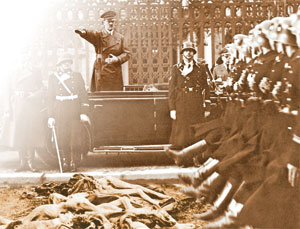The Result of the Darwin -
Hitler Coalition 40 Million Dead
In the light of what has been revealed about Social Darwinism so far, it should be no surprise that the Nazis, infamous architects of one of the most terrible acts of genocide in history, were tightly linked to it.
When one examines the writings, speeches and documents of Hitler and other Nazi ideologues, it's clear that they founded their policies on Darwinism.
Hitler thought that he could improve human race, as animal breeders do. He claimed that those he saw as "polluting" the Aryan race, those with genetic illnesses and the weak all needed to be eliminated; and he ordered the ruthless extermination of millions—proofs that he regarded human beings as animals and was attached to Darwinism. In an article titled "The Nazi Terror," Alexander Kimel—one of the few to survive the Nazi genocide—emphasizes the link between Darwinism and Nazism and describes how it was that the Nazis, with their belief in Social Darwinism, were able to treat people like animals and feel absolutely no pity for them:
Nazism with the acceptance of social Darwinism, equated man with animals, rob him of individual freedom of making choices, the ability to think for themselves. Brutality, terror, mendacity and ruthless exploitation of man by men became the norm of behavior. If the same laws of natural selection like the animals rule man, when the spark of the divine is removed from man's consciousness than [sic] men can be treated like an animals [sic]; he can be bred artificially, and treated like cattle. For example the war and the reckless conduct of the war brought very high casualties. Hitler tried to improve the situation, not by cutting losses, but by improving the breeding methods. In Auschwitz ... Mengele [a Nazi doctor] was [sic] conducted "scientific" experiments on twins, killing them, dissecting them, trying to figure out how to improve the breeding methods, to double the output of the German women. The Germans were treated like breeding animals the S.S. - their shepherds and their master breeder - their Fuhrer. The Germans were treated like prize cattle, other nationalities were treated like ordinary cattle and the Jews like vermin.84
 |
| Orphaned and neglected children were some of those who came in for the greatest share of Nazi cruelty. |
The Nazis adopted this perspective to perpetrate one of the worst acts of genocide ever. The deception of the "superior race" that Hitler maintained was based on the falsehood of inequality among groups within a particular species. According to Hitler and his supporters, while some species evolved, some individuals or groups within that species had remained backward and primitive. This perverted claim, constituting the bedrock of racism, was one fundamental element of Darwin's theory. In a book about Auschwitz, Dr. Karl A. Schleunes, a professor of history, accepts Darwinism's so-called scientific justification for racism:
Darwin's notion of struggle for survival … justified the racists' conception of superior and inferior peoples and nations and validated the conflict between them.85
Evolutionist scientists painted just the kind of theoretical picture the Nazis desired. For example, the evolutionist Konrad Lorenz, regarded as the founder of modern ethology (the science of animal behavior), compared the improvement of races with biological structures:
p>Just as in cancer the best treatment is to eradicate the parasitic growth as quickly as possible, the eugenic defense against the dysgenic social effects of afflicted subpopulations is of necessity… When these inferior elements are not effectively eliminated from a [healthy] population, then - just as when the cells of a malignant tumor are allowed to proliferate throughout the human body - they destroy the host body as well as themselves.86
Regarding different races or a society's poor and needy as a kind of burden to be eliminated is inexplicably primitive and barbaric. The Nazis sought to conceal their savagery behind a so-called scientific mask, citing Darwinism's deceptions. Joseph Tenenbaum, author of Race and Reich:The Story of an Epoch, summarizes how Nazi policies took shape:
… struggle, selection, and survival of the fittest, all notions and observations arrived at … by Darwin … but already in luxuriant bud in the German social philosophy of the nineteenth century. … Thus developed the doctrine of Germany's inherent right to rule the world on the basis of superior strength … [of a] "hammer and anvil" relationship between the Reich and the weaker nations.87
 |
| Hitler at the Nuremberg rally |
After describing how the Nazis shaped their entire policies according to the lights of Darwinism, missing not a single point, Tenenbaum goes on:
Their political dictionary was replete with words like space, struggle, selection, and extinction (Ausmerzen). The syllogism of their logic was clearly stated: The world is a jungle in which different nations struggle for space. The stronger win, the weaker die or are killed…88
In the 1933 Nuremberg rally, Hitler proclaimed that "higher race subjects to itself a lower race … a right which we see in nature and which," because it was founded on science, "can be regarded as the sole conceivable right."89 By making this claim, he of course defended one of the worst falsehoods in history.
Hitler's words in his "On the Fate of the Nation" speech are a summary of Darwinist views:
Among the most motivating factors of life are self-defense and the protection of future generations. Politics is nothing more than people's struggle for survival. This powerful wish to live is universal and directs the entire nation. The desire to survive must lead to conflict, because as well as being unsatisfiable this desire is also the foundation of life. The room to live is limited. Ruthlessness is therefore an inseparable part of humanity! Man became lord of the earth as the result of conflicts and constant struggle. This is the superiority not of mankind but of the strength of those who attain power and dominion. There are differences between races. The world took its culture from an elite class. Whatever we see today is all the result of Aryan work and success. However, the real factor in every race that leads to results is the important individuals it manages to raise. It is not democratic multitudes that have shaped mankind, but important individuals.90
 |
| An image of Germany in 1945 |
Hitler's perverted rantings influenced a great many at the time. Tens of thousands of the ignorant signed up to these assumptions, products of Hitler's imagination. As already emphasized, the urge for conflict or a ruthless struggle for survival does not advance societies' progress. All individuals strive for a wealthier, more pleasant life, but achieving that goal is directly proportionate to their society's attachment to spiritual and moral values. Seeking to eliminate others through endless aggression merely damages all parties. Physical or cultural differences do not make one race superior to another. On the contrary, in climates where peace and security prevail, differences are valuable elements that bring about cultural enrichment.
If these differences are to be transformed into cultural richness, religious moral values are essential. No matter what the circumstances, God has commanded people to be forgiving, never to depart from the path of justice, and to treat others with affection and compassion. Believers know that there is great wisdom in the creation of different races and nations, and therefore act in a spirit of brotherhood and solidarity. Arrogantly seeking to classify people according to the race they belong to, in the absence of any justification, is a feature of unbelievers and those who set up other deities beside God. One verse describes the unbelievers' fanatical rage:
Those who disbelieve filled their hearts with fanatical rage – the fanatical rage of the Time of Ignorance... (Surat al-Fath, 26)
Under the influence of his mental imbalance, Hitler saw the fact that Darwin's theory ran so parallel to his own twisted views as an excellent means of spreading them. His attachment to Darwinism can be seen in his book Mein Kampf, published in 1925. In Chapter 4, for example, he wrote that Darwinism was the only basis of a successful Germany. Robert Clark, author of Darwin: Before and After, makes this comment on Hitler's devotion to Darwinism:
 |
| Hitler and the Nazis reinforced their perverted ideas—the product of their own mental instabilities— with Social Darwinist statements, and carried out the worst slaughter in world history. |
Evolutionary ideas - quite undisguised - lie at the basis of all that is worst in Mein Kampf - and in his public speeches. … Hitler reasoned … that a higher race would always conquer a lower.91
Beate Wilder-Smith, author of The Day Nazi Germany Died, describes the fundamental factor in Nazi doctrine:
One of the central planks in Nazi theory and doctrine was … evolutionary theory [and] … that all biology had evolved … upward, and that … less evolved types … should be actively eradicated [and] … that natural selection could and should be actively aided, and therefore [the Nazis] instituted political measures to eradicate … Jews, and … blacks, whom they considered as "underdeveloped". 92
In American Scientist, Professor George J. Stein wrote an article headed "Biological Science and the Roots of Nazism":
… straightforward German social Darwinism [was] of a type widely known and accepted throughout Germany and … more importantly, was considered by most Germans, scientists included, to be scientifically true. More recent scholarship on national socialism and Hitler has begun to realize that … [their application of Darwin's theory] was the specific characteristic of Nazism. National socialist "biopolicy," … [was] based on a mystical-biological belief in radical inequality, … based on the eternal struggle for existence and the survival of the fittest as the law of nature, and the consequent use of state power for a public policy of natural selection…93
 |
| Hitler's book Mein Kampf included a great many Darwinist statements. |
Professor Stein's article makes clear that the claim that human beings are no different from animals underlay German Social Darwinism. He continues:
The basic outline of German social Darwinism [was] … man was merely a part of nature with no special transcendent qualities or special humanness. On the other hand, the Germans were members of a biologically superior community … politics was merely the straightforward application of the laws of biology. In essence, Haeckel and his fellow social Darwinists advanced the ideas that were to become the core assumptions of national socialism…. The business of the corporate state was eugenics or artificial selection….94
These errors of National Socialism, clearly set out in Stein's text, prepared the groundwork for a world war in which many countries were forced to participate. Nazism, which grew and developed with the support of Darwin's illusory theories, was the architect of a disaster the like of which the world had seldom ever seen. So terrible was this catastrophe that millions lost their lives and whole cities were wiped off the map. The worst harm was suffered by German society itself—which Nazi propaganda had claimed would gain strength and progress. Once again it was demonstrated that ruthless conflict and seeking to eliminate others can never carry a nation forward. As long as he lived, Hitler never abandoned the view Nazis held of themselves and others, which he summarized in the words: "We Nazis … are barbarians! We want to be barbarians. It is an honorable title [for, by it,] we shall rejuvenate the world."95
As in Sir Arthur Keith's words, Hitler "consciously sought to make the practice of Germany conform to the theory of evolution."96 About the theory of evolution, Hitler and war, Keith says the following:
 |
If war be the progeny of evolution - and I am convinced that it is - then evolution has "gone mad", reaching such a height of ferocity as must frustrate its proper role in the world of life... There is no way of getting rid of war save one, and that is to rid human nature of the sanctions imposed on it by the law of evolution.97
In Hitler's Personal Security, Peter Hoffmann discusses Hitler's Darwinist views:
Hitler believed in struggle as the Darwinian principle of human life that forced every people to try to dominate all others; without struggle they would rot and perish. Even in his own defeat in April 1945, Hitler expressed his faith in the survival of the stronger and declared the Slavic peoples to have proven themselves the stronger.98
In short, as can be seen from the opinions of a great many historians and researchers, as well as from Hitler's writings and speeches, Nazism drew strength and nourishment from Darwinism and using allegedly scientific arguments, Hitler and the other Nazi leaders sought to justify all their own psychopathic cruelty. In fact, the cultural environment that encouraged such an ideology also bore traces of Darwinism. As we shall see in the following pages, the Social Darwinism that entered Germany in the first half of the 20th century, thanks to fanatical Darwinists like Ernst Haeckel, profoundly influenced German society and constituted a most important philosophical foundation for Nazism's success.
War in Nazi Germany and Evolution
 |
According to Social Darwinism's perverted thinking, war allows societies to advance, selects the fittest and eliminates the weak. War is regarded as a positive force because it eradicates not only weak races, but also the weaker within the "superior race." That's why Social Darwinism approves of war. The Nazism adopted militarism with the same Social Darwinist logic. Robert Clark, in Darwin: Before and After, cites Mein Kampf as a reference and provides the following information about Hitler:
Hitler's attitude to the League of Nations and to peace and war were based upon the same principles. "A world court … would be a joke … the whole world of Nature is a mighty struggle between strength and weakness - an eternal victory of the strong over the weak. There would be nothing but decay in the whole of nature if this were not so. States which [violate] … this elementary law would fall into decay. … He who would live must fight. He who does not wish to fight in this world where permanent struggle is the law of life, has not the right to exist." To think otherwise is to "insult" nature. "Distress, misery and disease are her rejoinders."99
 |  |
| August 19, 1942: People in the French coastal town of Dieppe murdered by the Nazi garrison. Top right: Germans carrying heavy weapons during fierce fighting on the Norwegian front. Social Darwinist logic caused a great many deaths in the wars of the last century, and a great many countries to be ruined. |
With Social Darwinism, the ideology of conflict and warlike hysteria grew stronger. Darwinist concepts were a very influential catalyst that encouraged these trends and led to them being adopted by an entire society. For the first time, racism and a longing for conflict thus found an alleged scientific foundation and were presented to society as an irrefutable fact. The writings of Dr. Albert Edward Wiggam, an evolutionary theoretician during the Nazi era, published in 1922, reflect one of "deceptions" most frequently encountered in the world of German ideas of the time:
 |
| People dying or about to die of starvation at the Auschwitz concentration camp, in which between three and four million people were killed. The Nazis' obsession with the false idea of the master race, which they based on social Darwinism, led to millions of innocents dying in this manner. |
 |
| Many German ideologues perversely believed that war and conflict hastened evolution by causing humanity to progress. The Nazis, believing in the alleged superiority of the Aryan race, sparked World War II in order to make their race even more "pure" and cost the lives of some 40 million people. |
... at one time man had scarcely more brains than his [so-called] anthropoid cousins, the apes. But, by kicking, biting, fighting … and outwitting his enemies and by the fact that the ones who had not sense and strength enough to do this were killed off, man's brain became enormous and he waxed both in wisdom and agility if not in size …100
The conclusion the Nazis drew from this imaginary "evolutionary history," the product of a sick mentality, is this: According to the Nazis' false perspective, war was constructive in long term, because evolutionists maintained that human beings advanced only by means of lethal conflict. Like Hitler and Rosenberg, other Nazi ideologues also claimed that contemporary civilizations had come into being chiefly through constant war. Various so-called scientists of the time also defended this twisted viewpoint.
University of Berlin's Professor Haeckel, for instance, a known proponent of Darwinism, praised the ancient Greek militaristic state of Sparta, claiming that the Spartans being a chosen people explained why they were so successful and superior to others. He said that by killing all but the "perfectly healthy and strong children" the Spartans were "continually in excellent strength and vigor."101 Haeckel regarded these savage practices as justified.
 |
| Hitler and the Nazis' obsession with establishing a master race led to the deaths of millions of innocents, with millions more suffering inhuman treatment for years. |
According to him, Germany should have followed this Spartan custom too, because infanticide of the deformed and sickly children was "a practice of advantage to both the infants destroyed and to the community." These unconscionable recommendations of Haeckel's are important in revealing the logical framework represented by the unscientific claims of Darwinism, according to which the idea that all lives have equal value and need to be protected was merely a "traditional dogma" and allegedly a violation of scientific truth.102 No rational person of good conscience could ever accept these claims, but eminent Germans strongly adopted them at one time.
Not just in Germany but in a great many parts of the world, Social Darwinism rejected the moral values, along with virtues such as compassion, protection, cooperation, sympathy and patience taught by the Divine religions. In place of these virtues, it claimed that killing those who were incompatible with society's interests—through destruction and ruthlessness, all of which belong to satan, the great misleader of humanity—was actually superior. The hatred they felt for Divine religions lies at the heart of the Nazis' enmity towards the Jews.
Yet neo-Nazism still survives in the world, showing that this sick ideology continues to pose a danger. No matter what name it may go by, the lifestyle that Social Darwinism advances consists solely of conflict, struggle, bloodshed, war, suffering and fear. Death camps like Auschwitz are where Social Darwinism is put into practice. Darwinism inevitably leads to Social Darwinism. In a world where Social Darwinism again comes to rule, new Auschwitzes will be inevitable.
Hitler Was a Tyrant Because He Was a Social Darwinist
 | |
| Three Yugoslavs, whom the German occupying forces killed and put on public display in 1940. |
Hitler and the other Nazi leaders experienced no guilt over the savagery they inflicted for so many years, and even regarded themselves as heroes. They thought of themselves as saviors who would bring about the evolution of humanity, to whom later evolved generations would feel grateful. That, however, was a lie.
The dangerous ideas that resulted from Hitler's sick mentality were broadened and put into practice under the influence of Social Darwinism. According to his ideology, concentration camps were not prisons where innocents were tortured and exterminated, but rather places of quarantine where sickly, weak and undesirable elements were isolated for the protection of the master race. Thus Darwinism went down in history as a false science that constituted the basic philosophy of a war and genocide that inflicted the worst destruction, suffering and terror in history. Hitler himself went down as a tyrant who implemented this false science.
An Infamous Fascist Coalition: Darwin – Haeckel – Hitler | ||||||
| Ernst Haeckel, the foremost representative of Charles Darwin and Social Darwinism in Germany, made the following comment after reading The Origin of Species: ... [I] found in Darwin's great unified conception of nature and in his overwhelming foundation for the doctrine of evolution the solution of all the doubts which had bothered me since the beginning of my biological studies.1
Haeckel imagined that Darwin's book had lifted all his doubts, but was of course mistaken. The theory of evolution, formulated under the primitive conditions of the time, was unable to advance a valid, consistent and (even more importantly) scientific explanation of how life began. In The Wonders of Life, Haeckel summed up his irrational views regarding the human races that he had developed on the basis of Darwinism: Though the great differences in the mental life and the civilization of the higher and lower races of men are generally known, they are, as a rule, undervalued, and so the value of life at different levels is falsely estimated. … [The] lower races (such as the Veddahs or Australian Negroes) are psychologically nearer to the mammals (apes and dogs) than to civilized Europeans; we must, therefore, assign a totally different value to their lives. … The gulf between [the] thoughtful mind of civilized man and the thoughtless animal soul of the savage is enormous – greater than the gulf that separates the latter from the soul of the dog.2 These claims of Haeckel's were devoid of any scientific foundation. Nonetheless, his beliefs were adopted by a great many people as scientific fact. Haeckel also developed a kind of materialist belief from the theory of evolution, which he gave the name monism. This perverted idea entirely rejected the existence of the soul and reduced everything to matter. Haeckel wrote: ... we are for the first time enabled to conceive of the unity of nature ... [so that we may have] a mechanico-causal explanation of even the most intricate organic phenomena, [the result being that] the distinction between animate and inanimate bodies does not exist. ... [All natural phenomena, whether] a stone … thrown into the air ... [or] sulphur and quicksilver ... [uniting] in forming cinnabar ... [are] neither more nor less a mechanical manifestation of life than the growth and flowering of plants, than the propagation of animals or the activity of their senses, than the perception or the formation of thought in man.3 In fact, Haeckel was deceiving himself by imagining that he had found the answers to many questions with a materialist perspective. The materialist view, that there is no difference between animate and inanimate bodies and that everything has a mechanical explanation, has been dealt a severe blow by scientific progress and research carried out in the 21st century, and its alleged scientific underpinnings have been totally invalidated. Every new discovery, every scientific advance, has revealed the fact that the universe is a flawless product of creation. The universe is not eternal and infinite, as materialists would have us believe, and did not come into being as the result of mechanical developments and influences. God created the universe and everything within it, and when the time appointed by our Lord comes, the universe will come to an end, as will all human beings and other entities. On account of his materialist way of thinking, however, Haeckel rejected the Divine religions and the humanity and compassion imparted by religious moral values. He praised the "artificial human selection" practiced by the Spartans (members of the Greek city-state founded in the 9th century BC that rejected art, philosophy and literature and was built solely on military force) by defending eugenic barbarity. During the time of the Spartans, under a special law, newly born babies were subjected to careful examination, those who were weak, sickly or had physical defects were ruthlessly killed. Only strong and perfectly healthy children were allowed to live. Haeckel defended this barbaric Spartan practice that envisaged the murder of innocent babies.4
This is how Haeckel responded to those who criticized him: What good does it do to humanity to maintain artificially and rear the thousands of cripples, deaf-mutes, idiots, etc., who are born every year with an hereditary burden of incurable disease? 5 No doubt, this logical framework that Haeckel proposed is inhuman. According to him, feelings of love, compassion and affection should be directed solely towards those who can be of benefit. This selfish attitude flourishes under the twin influences of materialism and Darwinism. People who live by religious moral values, however, feel compassion for the needy and seek to protect them, even if they have nothing at all to gain by doing so. That is true humanity. For example, it is revealed in the Qur'an that true believers offer food to the poor, captives and the needy before themselves, and that they do this solely to gain God's approval: They give food, despite their love for it, to the poor and orphans and captives: "We feed you only out of desire for the Face of God. We do not want any repayment from you or any thanks." (Surat al-Insan, 8-9) On the other hand, the monists, led by Haeckel, claimed that not only physical features but also character could stem from genetic defects, and maintained that everyone they considered flawed should be eliminated. Haeckel's books played an important role in the acceptance of the Nazi eugenics program. Wilhelm Bölsche, Haeckel's student and biographer, directly transmitted Haeckel's Social Darwinist ideas to Hitler. Furthermore, the Archiv für Rassen und Gesellschaftsbiologie ("Archive for Racial and Social Biology," published from 1904 to 1944) became the main organ for disseminating the deceptions of eugenics and false Nazi science, and regularly carried extracts from Haeckel's dangerous works.6 In the words of the historian Daniel Gasman: Hitler's views on history, politics, religion, Christianity, nature, eugenics, science, art, and evolution, however eclectic, and despite the plurality of their sources, coincide for the most part with those of Haeckel and are more than occasionally expressed in very much the same language.7 7 Haeckel defended suicide and euthanasia. According to him, a human being came into being solely as the result of sexual relations between the mother and father. For that reason, when life became burdensome, that person could lose it: If, then, the circumstances of life come to press too hard on the poor being who has thus developed, without any fault of his, from the fertilized ovum – if, instead of the hoped-for good, there come only care and need, sickness and misery of every kind – he has the unquestionable right to put an end to his sufferings by death. … The voluntary death by which a man puts an end to intolerable suffering is really an act of redemption.8 However, human beings do not come into existence as the result of blind chance. God creates them, and behind human creation there is a purpose that is revealed in the Qur'an: I only created jinn and man to worship Me. (Zariyat Suresi, 56)
Humans are responsible for every action they perform throughout the course of their lives, and will have to account for every moment in the Hereafter. Those like Haeckel, who incite others to suicide and murder, are doubtless assuming a grave responsibility for which they will be unable to account. In his Wonders of Life, Haeckel claimed that newborn babies were deaf and devoid of consciousness (which is not the case), and thus did not have a human soul. Based on that unscientific claim, he defended the destruction of abnormal newborn infants and suggested that this cannot rationally be classed as murder. As we have seen, Haeckel openly defended murder, and encouraged those around him to murder. Haeckel was sufficiently heartless to support not only voluntary euthanasia, but its compulsory equivalent. He expressed his anger on this subject in these terms: "hundreds of thousands of incurables – lunatics, lepers, people with cancer, etc. are artificially kept alive … without the slightest profit to themselves or the general body."9 The solution that he proposed was this: ... the redemption from this evil should be accomplished by a dose of some painless and rapid poison … under the control of an authoritative commission.10 The savagery he supported had very damaging effects in Germany. Haeckel's research led the way to the euthanasia program known as T4, under which some 300,000 mentally handicapped, those with physical deformities, incurables and other "undesirables" were ruthlessly killed. Haeckel's cruelty, and the killings Hitler encouraged and permitted, had but one source: Social Darwinism. The eugenics, euthanasia, forced sterilization, concentration camps, racial purity and gas chambers of the mid-20th century emerged as a result of the Darwin-Haeckel-Hitler coalition, representing the worst and most ruthless cruelty in the history of humanity. Notes1. Daniel Gasman, Scientific Origins, s. 6; Benjamin Wiker, Moral Darwinism: How We Became Hedonists, Intervarsity Press, 2002, s. 257 2. Ernst Haeckel, The Wonders of Life: Popular Study of Biological Philosophy, Çeviri: Joseph McCab (New York: Harper & Brothers, 1905), s.390-91; Daniel Gasman, The Scientific Origins of National Socialism: Social Darwinism in Ernst Haeckel and the German Monist League, (London: MacDonald, 1971), s.39-40 3. Ernst Haeckel, The History of Creation, s. 1.23 4. Ernst Haeckel, The History of Creation, s. 1.75-76 5. Benjamin Wiker, Moral Darwinism, s. 260 6. Robert Jay Lifton, The Nazi Doctors, New York: Basic Books, 1986, s.441, 161 7. Daniel Gasman, Scientific Origin, s. 161 8. Ernst Haeckel, Wonders of Life, s.112-14 9. Benjamin Wiker, Moral Darwinism, s. 262; Ian T. Taylor, In The Minds of Men: Darwin and the New World Order, 3. baskı, TFE Publishing, 1991, s.409 10. Ernst Haeckel, The Wonders of Life, New York: Harper, 1904, s. 119 |
Footnotes
84. Alexander Kimel, "Nazi Terror;" http://www.kimel.net/terror.html
85. Schleunes, The Twisted Road to Auschwitz, pp. 30-32.
86. A. Chase, The Legacy of Malthus; The Social Costs of the New Scientific Racism, New York: Alfred A. Knopf, 1980, p. 349.
87. Arthur Keith, Evolution and Ethics, New York: G.P. Putnam's Sons, 1946, p. 230.
88. The Nuremberg Trials, vol. 14, Washington D.C: U.S. Government Printing Office, p. 279.
89. J. Tenenbaum, Race and Reich, New York: Twayne Pub., 1956, p. 211.
90. Adolf Hitler, Um das Schicksal der Nation, in B. Dusik (ed.), Hitler. Reden Schriften Anordnungen. Februar 1925 bis Januar 1933, vol. 2(2), Munich, 1992, Doc 245.
91. Robert Clark, Darwin: Before and After, Grand Rapids International Press, Grand Rapids, MI, 1958, p. 115.
92. Beate Wilder-Smith, The Day Nazi Germany Died, Master Books, San Diego, CA, 1982, p. 27.
93. George J. Stein, "Biological Science and the Roots of Nazism," American Scientist 76(1): 50–58, 1988, p. 51.
94. Ibid., p. 56.
95. H. Rauschning, The Revolution of Nihilism, New York: Alliance Book Corp., 1939.
96. Keith, Evolution and Ethics, p. 230.
97. Ibid., p. 105.
98. Peter Hoffman, Hitler's Personal Security, London: Pergamon Press, 1979, p. 264.
99. Clark, Darwin: Before and After, pp. 115-116
100. A. E. Wiggam, The New Dialogue of Science, Garden City, NY: Garden Publishing Co., 1922, p.
- Introduction
- Social Darwinism
- The History of Ruthlessness, from Malthus to Darwin
- The “Robber Barons,” Darwin’s Followers
- Social Darwinism and the Favored Races Myth
- The Result of the Darwin-Hitler Coalition 40 Million Dead
- Social Darwinists' Sterilization and Death Laws
- A Theory That Belittles Women
- Darwinism and Moral Collapse
- The “Evolutionary Psychology” Error
- Conclusion
- The Deception of Evolution



